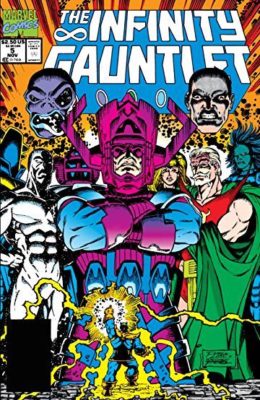 Let’s geek out for a moment.
Let’s geek out for a moment.
Marvel Studios’ latest blockbuster, Avengers: Endgame, is neck-and-neck with James Cameron’s Avatar for the title of highest grossing film ever and the “superhero fever” critics claim won’t last long doesn’t seem to be subsiding anytime soon.
A question I wanted to examine is what fiction writers can learn from the success of comic book adaptations? The answer has to do with world building and the omniscient point of view. Last month I picked up a copy of Jim Starlin’s The Infinity Gauntlet, a collection of six comic books from 1991 serving as the source material for the Avengers films directed by Anthony and Joe Russo.
Science fiction and fantasy writers often talk about world building in the style of Philip K. Dick or J.R.R. Tolkien: developing unique characters, settings and languages to bring a story to life. Comic book writers do the same thing and although world building is easier in a medium full of illustrations, they’re still creating massive realities from scratch.
The Infinity Gauntlet & Uniting the Marvel Universe
Starlin and his team of writers and illustrators literally had a universe at their fingertips, dozens of superheroes and interconnected storylines developed across hundreds of comic books over decades.
The Infinity Gauntlet brought nearly all of these heroes together to fight the Mad Titan Thanos. Iconic heroes like Captain America, Iron Man, the Incredible Hulk and Spider-Man — who are all household names — and less recognizable beings like the immortal Celestials all had a part to play in the story.
Tolkien may have created Middle Earth for his novels, but for this comic book series the writers looked to the vastness of space. Characters in the story moved from New York City to the far corners of the universe, a dimension called the Soul World and a creepy temple serving as the domain for the Mistress of Death.
From a writer’s perspective, it’s instructive to see which heroes were brought to the forefront as main characters and how “screen time” was balanced for beloved characters with huge followings of their own. Keep in mind that crossover projects at this scale can end up daunting for writers and disappointing for fans, so they had to be careful.
Knowing All, Seeing All with Omniscient POV
Comic books typically use the omniscient point of view, which would be the most effective in a story like The Infinity Gauntlet because it features an army of characters and an entire universe to cover.
Using the immeasurable power of the infinity stones, Thanos snaps his fingers and wipes out half the living beings in the universe, including a bunch of Marvel heroes. The ones who survive must travel across space to defeat Thanos and reverse the damage.
Omniscience allows the reader to know the motivations and plans of multiple characters at the same time versus inferring these things under a more limited point of view. In the very beginning, for instance, Thanos goes into an internal monologue about why he collected all six infinity stones and what he plans to do with them. He also claims to possess “the unbridled power of god,” yet it’s the reader that is truly godlike by knowing all of the character’s thoughts early on in the story.
Readers also transition between Dr. Strange’s New York City apartment (where the Silver Surfer drops in to warn the Avengers about Thanos) and the Temple of the Mistress Death somewhere in deep space (where the final battle ensues). The style is very cinematic, giving the reader all the necessary information required at that point in the story and keeping them hooked into the action without missing a beat.
Knowing your audience and what pace they are looking for is also important. Let’s face it, fans of the superhero genre don’t want to read five pages describing the look of a tree on a distant planet. They want to zip around the action and the omniscient point of view allows them to do this.
Reading The Infinity Gauntlet is worth it, if not for the entertainment value alone. While some writers may have reservations about looking to comic books for storytelling ideas, beyond the vibrant art boards and outlandish storylines are universal techniques we can all use.

Iris Zerba
Good comparison, but it’s hard to bring comic book heroes to the level of literary fiction, except on the level of pure action. Some of us will continue to love the turn of a good word or phrase plus insight into the human condition.